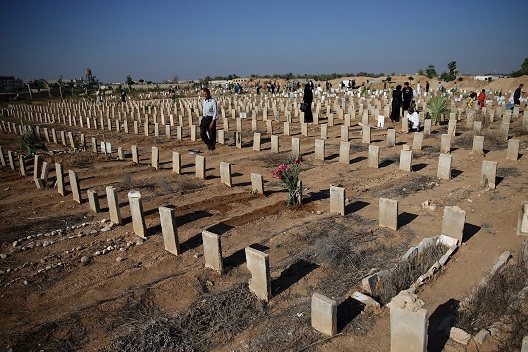 A recent editorial in The Los Angeles Times calls for American cooperation with Russia in Syria and, citing the Syria policy dissent memorandum offered by 51 “State Department staffers,” opines that “Frustrating as it may be, exploring the possibility of cooperation with Moscow in Syria is still preferable to trying to oust Assad through U.S. military action.” Like the administration whose failed Syria policy it supports, the editorial board enlists a straw man to make its point. The 51 diplomats and civil servants did not call for violent regime change. Their focus was on protecting civilians, enabling diplomacy, and implementing a genuine cessation of hostilities.
A recent editorial in The Los Angeles Times calls for American cooperation with Russia in Syria and, citing the Syria policy dissent memorandum offered by 51 “State Department staffers,” opines that “Frustrating as it may be, exploring the possibility of cooperation with Moscow in Syria is still preferable to trying to oust Assad through U.S. military action.” Like the administration whose failed Syria policy it supports, the editorial board enlists a straw man to make its point. The 51 diplomats and civil servants did not call for violent regime change. Their focus was on protecting civilians, enabling diplomacy, and implementing a genuine cessation of hostilities.
The resort to the straw man is no doubt effective. President Obama and his Syria policy supporters push on the open door of public sentiment when they suggest that the credible threat of military force and its judicious use in the Syrian context is to invite invasion, occupation, total ownership of someone else’s problem, a verbatim repeat of the Iraq fiasco, and possible war with Russia. Although it is disappointing that neither the administration nor its supporters will critique the dissent memo on its merits, the resort to the straw man admits that the merits exist and are not easily countered.
The 51 dissenters articulated points that have been employed repeatedly by senior officials of the United States government, the governments of allies and friends, and even the United Nations over the last several years: that the challenge of Syria is such that a policy deliberately and publicly setting aside the credible threat of military force is worse than useless; it actively encourages parties neck-deep in war crimes and crimes against humanity to do their absolute worst; it is a leverage-free approach offering nothing approaching an “or else.”
When the Assad regime—enthusiastically enabled by Russia and Iran—implements a civilian-centric policy of collective punishment and mass homicide, it does more than create a humanitarian abomination. By mandating mass migration and making the case for the Islamic State (ISIS, ISIL, Daesh) as an alternative model of governance, the regime and its helpers strike directly at Western, transatlantic political and security interests.
The State Department 51 spelled out the central reality: as long as collective punishment and mass homicide enjoy a free ride, the crisis will deepen and meaningful Syria peace talks will remain beyond reach. They did not counsel “trying to oust Assad through U.S. military action.” They did “see merit in a more militarily assertive U.S. role in Syria, based on the judicious use of stand-off and air weapons, which would undergird and drive a more hardnosed U.S.-led diplomatic process…”
One can mount a pertinent critique of the State Department memo without misrepresenting what 51 loyal, patriotic, and courageous public servants actually said. It has been argued here, for example, that it would have been better not to cite a specific military measure; that what is vitally important for diplomacy to work and for allies and friends to be defended is for the American commander-in-chief to register his intent with his national security hierarchy; to state clearly his desire to make Bashar al-Assad understand that a steep price will be paid every time he elects to eradicate human beings on an industrial scale. Once he has articulated intent and defined an objective, the president would receive and review implementable options: each containing an assessment of effects and risks. “Stand-off and air weapons” might top the list. But the key to anything happening that can enable effective diplomacy is the clear articulation of the commander-in-chief’s intent to put an end to the mass homicide free ride.
There is nothing wrong with seeking Russian cooperation in bringing the Syrian catastrophe to an end in ways that facilitate the exits of Assad and ISIS: two sides of the same criminal, terrorist coin; a coin that has purchased bottomless human misery and incalculable—if unintended—negative political consequences. Supporters of administration policy are free to examine the actual, documented behaviors of Russia, Iran, and the Assad regime and argue that diplomatic progress toward favorable outcomes is likely without the credible threat of American military force lurking in the background to protect civilians from mass slaughter. They are free to argue that the human and political prices—costs borne mainly (and thus conveniently) by others—justify the prospect of détente with Iran and a disinclination to rile Russia.
Indeed, the administration and supporters of its Syria policy are perfectly free to employ an army of straw men to mow down with impressive, and seeming cost-free efficiency. But winning this information battle does nothing for the home team. Deliberately evading the point made by 51 officials who have loyally implemented policies they know to be defective leads to nowhere and nothing. The professional risks they took in dissenting from failed policies and practices would ideally oblige those who disagree with their recommendations to employ a modicum of honesty.
Frederic C. Hof is director of the Atlantic Council’s Rafik Hariri Center for the Middle East.
Image: Photo: People visit graves of their relatives at a cemetery, on the first day of the Muslim holiday of Eid al-Fitr, which marks the end of the holy month of Ramadan, in the rebel-held Douma neighbourhood of Damascus, Syria July 6, 2016. REUTERS/Bassam Khabieh
